Spotlight on BES 491 undergraduate research student: Brandy Eckman
Champion Trees of Washington Park Arboretum
What is a Champion Tree?
A Champion Tree is the biggest tree of its species in either circumference, height, or spread (how far the branches spread out to either side). Their measurements are given a point valuation in American Forest Points and then sent to either the state, national, or international registry who all keep track of Champion Trees with the highest point values in each species.
Read moreAn Afternoon Walk at the Washington Park Arboretum
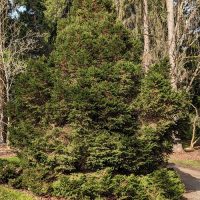
1) Picea abies Norway Spruce
This evergreen conifer displays a beautiful pyramidal shape that adorns the entrance of the Asian Maples when coming from the Graham Visitor Center.
In its native habitat, the mountains of northern and central Europe, this tree matures to 100 – 150 feet tall. However, naturalized trees planted in temperate regions of North America mature to 40 – 60 feet tall.
Evergreen Barberries at the Washington Park Arboretum
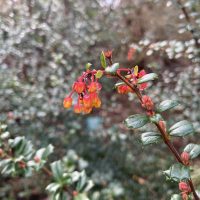
1) Berberis darwinii Michay, Darwin’s Barberry
This thicket-forming evergreen shrub is native to Chile and boasts small holly-like leaves, profuse orange blossoms, dark blue berries, and ample thorns.
Darwin is usually credited with “discovering” this species, however, it was known and used by Indigenous populations long before he collected it.
Michay is a serious environmental weed in New Zealand and is on the watch list in California.
February 2023 Plant Profile: Baker Cypress
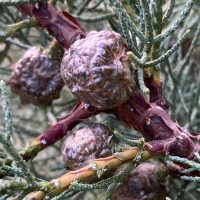
The Baker cypress, the most northern and hardiest cypress in North America is a tree with a challenging future ahead of it. Within its native range of southern Oregon and northern California there are several populations, many a long distance separate from others.
Read moreJanuary 2023 Plant Profile: Pitch Pine
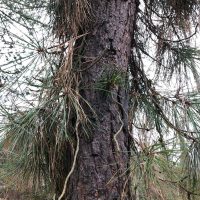
What better time than winter to highlight one of the Arboretum’s conifer specimens? January is also an excellent time to take a trip out to Foster Island to walk amongst some of the many birds that make the Arboretum home. Beside the path on Foster Island – just before you cross under the 520 bridge – you will find a pair of Pinus rigida. The species name rigida refers to its stiff and sharp cone scales and needles. The tree’s common name – pitch pine – derives from the high resin content in its wood.
Read moreNew Year Adornments at the Washington Park Arboretum
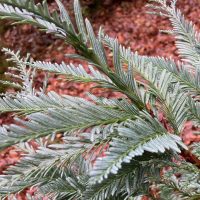
1) Sequoia sempervirens ‘Henderson Blue’ Coast Redwood
Coast Redwood typically has forest green needles, though cultivars range from frog-belly green to silver and powder blue.
This Winter Garden specimen is pruned regularly to keep it dense and short to best show off its beautiful foliage.
Sequoia sempervirens is native to the foggy northern California coast and is currently listed as endangered due to logging and habitat loss.
“Bonsai” Themed Specimen Collections at the Washington Park Arboretum
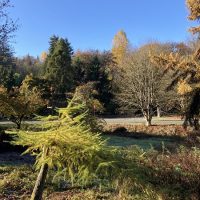
Bonsai literally means “tray gardening” or defined as the Japanese art of growing and training miniature trees in pots. These selections are reminiscent of the bonsai art form, although they were never grown in pots nor trained. Enjoy the photos!
1) Larix decidua European Larch
The larches are unusual conifers in that they are deciduous and drop all their leaves each autumn.
Read more“The Hunt for Red November” – Brilliant Reds of the Autumn Landscape
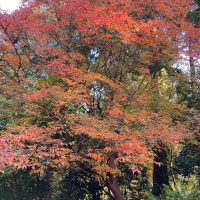
1) Acer palmatum ‘Beni otaki’ Red Bamboo / ‘Beni otaki’ Japanese Maple
The Red Bamboo or ‘Beni otaki’ Japanese Maple is a medium-sized Japanese maple, with deep red-purple foliage from spring to summer, which becomes green with maturity.
Autumn leaves turn a rich crimson.
Acer palmatum ‘Beni otake’ grows into a lovely rounded shape and is more tolerant of sun than most other Japanese maples.
“Sugar We’re Going Down” – The Sugar Maple Plant Highlight

When Fall Out Boy sang,
“We’re going down, down in an earlier round
And sugar, we’re going down swinging,”
they were actually referring to leaves falling in autumn and the wonderful process of tapping sugar maple trees for syrup (not really, but wouldn’t it be funny).
Read moreFantastic Fall Colors at the Washington Park Arboretum
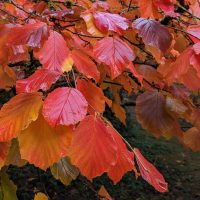
Fall has arrived at the Washington Park Arboretum and fantastic colors are here to welcome you! Come by and see the beautiful collections transition into winter dormancy.
1) Hamamelis x intermedia ‘Diane’ Witch-hazel
This is an Asian hybrid Witch-hazel.
The stunning colors of this small tree bring moments of summer during the cloudy fall days.
This witch-hazel and others can be found on the north side of the Witt Winter Garden.